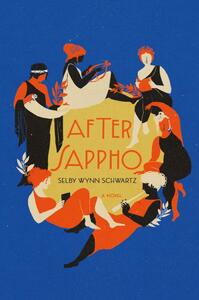Take a photo of a barcode or cover
informative
inspiring
mysterious
reflective
relaxing
slow-paced
Plot or Character Driven:
Character
Strong character development:
Complicated
Loveable characters:
No
Diverse cast of characters:
Yes
Flaws of characters a main focus:
Complicated
Thank you to NetGalley and RB Madia for providing me with this ARC Audiobook.
After finishing this book I was very uncertain about what rating it should get and even how I felt about the book!
I very much enjoyed the concept of the book, a group of women throughout the history of mankind that has been pushing for freedom and gender equality. There were also parts that I laughed out loud due to the witty comments that some of these women were making about society and men and their expectations of the "weaker sex".
But two elements made me unsure about the book. First, the lack of diversity among these women. They were all white and represented as modern, educated, and cultured women, which they were, but they were not the only ones. There were many women with the same qualities and some even more that were living in Asia, the Middle East, and Africa. I wished the author would have taken some time to research those cases as well and included them too.
The other element was the style of the book. In parts, it felt like a series of short essays or even paragraphs that were just typed after one another, but in some other parts, there was a connection between one part to the next. That made it hard to stay connected with the "characters" and the overall "story" that the book was trying to tell.
All that being said I did enjoy listening to the book and am interested to see what the author will come up with next!
After finishing this book I was very uncertain about what rating it should get and even how I felt about the book!
I very much enjoyed the concept of the book, a group of women throughout the history of mankind that has been pushing for freedom and gender equality. There were also parts that I laughed out loud due to the witty comments that some of these women were making about society and men and their expectations of the "weaker sex".
But two elements made me unsure about the book. First, the lack of diversity among these women. They were all white and represented as modern, educated, and cultured women, which they were, but they were not the only ones. There were many women with the same qualities and some even more that were living in Asia, the Middle East, and Africa. I wished the author would have taken some time to research those cases as well and included them too.
The other element was the style of the book. In parts, it felt like a series of short essays or even paragraphs that were just typed after one another, but in some other parts, there was a connection between one part to the next. That made it hard to stay connected with the "characters" and the overall "story" that the book was trying to tell.
All that being said I did enjoy listening to the book and am interested to see what the author will come up with next!
adventurous
challenging
emotional
informative
inspiring
reflective
fast-paced
Plot or Character Driven:
Character
Strong character development:
No
Loveable characters:
Yes
Diverse cast of characters:
Complicated
Flaws of characters a main focus:
Complicated
To be a woman lying in the temple of the Amazon, existing among each other, fighting for the rights to their own lives as they want, to be in charge of themselves. What a magnificent book of women who wanted to be anything other than what society wanted of them, wreathed in art as freedom and action and discussion. Just wait for the musical that I am going to conceive about Natalie Barney.
I received an advance audiobook copy from NetGalley and really enjoyed listening to it with one caveat— I’d often get lost in the number of characters and who was who at different times. I think this might not have been an issue with the print version. After Sappho is a celebration of independent women… a lot of women. So many I couldn’t keep them straight and not that they wanted to be kept straight. The poetic writing contributed to a peaceful, enjoyable listening experience where I felt like the narrator was speaking directly to me. Ultimately, though, I walked away as if I had stared a painting that I was told was high art but I just saw a painting. Perhaps that’s my shortcoming and not the book’s.
emotional
informative
inspiring
mysterious
reflective
sad
slow-paced
Plot or Character Driven:
Character
Strong character development:
N/A
Loveable characters:
Yes
Diverse cast of characters:
No
emotional
inspiring
slow-paced
Plot or Character Driven:
Character
Loveable characters:
Yes
Diverse cast of characters:
Yes
Flaws of characters a main focus:
No
„Po Safonie” to wielowątkowa podróż przez XIX i XX wiek. Podróż po historiach kobiet - queerowych intelektualistek, które łączy nie tylko miłość do sztuki, walka o równość i społeczną akceptację, ale także (a być może przede wszystkim?) łączy je Safona. Napisana w absolutnie przepiękny sposób, z pewnością nie da mi o sobie zapomnieć.
—————————————————
„[…] Aurel miała nadzieję, że pisarki nie podporządkowują się prawom, które ograniczały książki mężczyzn. Aurel twierdziła, że nadszedł czas, by kobiety przejęły język dla siebie, choćby po jednym słowie, by przejęły własne imiona i się stały. By stały się choćby jednym słowem.”
„W naszych safickich idyllach pisałyśmy całe tomy miłosnych listów. Nawet gdy idylla się kończyła, nie zrywałyśmy ze sobą kontaktu, a jedynie zmieniałyśmy tonację naszej intymności. Przyjaciółka, towarzyszka, ukochana: dla nas uczucia miały wiele odcieni i odmian.”
„Gdy tylko Matilde Serao poznała Eleonorę Duse, zakochała się do końca życia. Często powtarzała: Gdybym była mężczyzną, nie byłoby temu końca.”
„[…] Nora zatrzaskiwała drzwi, zamykając stulecie kobiet, które znały tylko jeden czasownik - «poślubić». Mokra sól, która paliła oczy Riny, to nie był płacz. To stulecie uchodziło z jej ciała.”
„[…] To oczywiste, że kobiety chcą być istotami ludzkimi, a nie laleczkami, które tańczą ku uciesze mężów, posłusznie rodzą dzieci i same się unicestwiają. Kto nie chciałby mieć tego, co połowa populacji dostała po prostu z racji urodzenia? […] jeśli kobieta chce pracować, pisać, myśleć samodzielnie, podejmować działania, kochać inną kobietę, to natychmiast spotykają ją szyderstwa i zarzuty, że jest wynaturzona i perwersyjna, tylko dlatego, że przejawia te same cechy, które mężczyźni cenią u siebie.”
„W Świątyni 𝘢́ 𝘭’𝘢𝘮𝘪𝘵𝘪𝘦́ Natlie Barney oznajmiła: Maszerujmy po miłość, tal jak mężczyźni maszerują na wojnę!”
„[…] W końcu napisała dla Virginii opowieść o tym, jak świat bezpowrotnie zmienił kolor, a to jeden ze sposobów na to, by powiedzieć, że się w kimś zakochało.”
„[…] A może te szpilki trzymały w miejscu naszą nadzieję, jak kwitnący goździk w klapie Liny Poletti, że kobiety będą kiedyś mogły otwarcie całować się w literaturze.”
—————————————————
„[…] Aurel miała nadzieję, że pisarki nie podporządkowują się prawom, które ograniczały książki mężczyzn. Aurel twierdziła, że nadszedł czas, by kobiety przejęły język dla siebie, choćby po jednym słowie, by przejęły własne imiona i się stały. By stały się choćby jednym słowem.”
„W naszych safickich idyllach pisałyśmy całe tomy miłosnych listów. Nawet gdy idylla się kończyła, nie zrywałyśmy ze sobą kontaktu, a jedynie zmieniałyśmy tonację naszej intymności. Przyjaciółka, towarzyszka, ukochana: dla nas uczucia miały wiele odcieni i odmian.”
„Gdy tylko Matilde Serao poznała Eleonorę Duse, zakochała się do końca życia. Często powtarzała: Gdybym była mężczyzną, nie byłoby temu końca.”
„[…] Nora zatrzaskiwała drzwi, zamykając stulecie kobiet, które znały tylko jeden czasownik - «poślubić». Mokra sól, która paliła oczy Riny, to nie był płacz. To stulecie uchodziło z jej ciała.”
„[…] To oczywiste, że kobiety chcą być istotami ludzkimi, a nie laleczkami, które tańczą ku uciesze mężów, posłusznie rodzą dzieci i same się unicestwiają. Kto nie chciałby mieć tego, co połowa populacji dostała po prostu z racji urodzenia? […] jeśli kobieta chce pracować, pisać, myśleć samodzielnie, podejmować działania, kochać inną kobietę, to natychmiast spotykają ją szyderstwa i zarzuty, że jest wynaturzona i perwersyjna, tylko dlatego, że przejawia te same cechy, które mężczyźni cenią u siebie.”
„W Świątyni 𝘢́ 𝘭’𝘢𝘮𝘪𝘵𝘪𝘦́ Natlie Barney oznajmiła: Maszerujmy po miłość, tal jak mężczyźni maszerują na wojnę!”
„[…] W końcu napisała dla Virginii opowieść o tym, jak świat bezpowrotnie zmienił kolor, a to jeden ze sposobów na to, by powiedzieć, że się w kimś zakochało.”
„[…] A może te szpilki trzymały w miejscu naszą nadzieję, jak kwitnący goździk w klapie Liny Poletti, że kobiety będą kiedyś mogły otwarcie całować się w literaturze.”
challenging
inspiring
reflective
slow-paced
challenging
reflective
slow-paced






